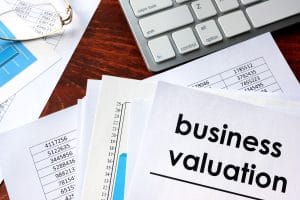How to Value a Small Business in Tennessee
 There is no perfect formula for valuing a business. A retail chain is valued differently from a law firm, which is valued differently from a start-up. Businesses that can be divided and sold have different values than ones which cannot. As a general rule, the value of a business comes down to this – what is the buyer willing to pay for the business?
There is no perfect formula for valuing a business. A retail chain is valued differently from a law firm, which is valued differently from a start-up. Businesses that can be divided and sold have different values than ones which cannot. As a general rule, the value of a business comes down to this – what is the buyer willing to pay for the business?
If you are buying a business, you want to pay as little as possible. If you are selling the business, then obviously, you want to get as much as you can for the business. If there is a buy/sell agreement that controls the terms of the sale, then the agreement may include a valuation method. If the business is being valued for insurance or tax purposes, the valuation methods may be controlled by the contract, the applicable insurance policy or tax laws.
There are several common valuation methods, but three are commonly used. We will discuss those common methods here.
The net assets valuation method
This valuation method essentially examines everything the business owns and then subtracts what the company owes. Businesses with land and/or substantial assets are often valued using this method, which can be used for the sale of the business. The method can also be used if the owner wants to liquidate the assets: sell the assets and pocket whatever’s left after the debts are paid.
The assets that are valued include tangible assets such as:
- Any land or buildings
- Machinery, tools, and equipment including vehicles
- The inventory
- Accounts receivable
- Bank accounts
The assets may also include intangible assets such as goodwill (the reputation of the business) that are more difficult to value. Intangible assets include any patents, copyrights, trademarks, and trade secrets. A common intangible asset of significant value is the customer contact information.
The debts include any mortgages, any loans, and any sums due to employees and vendors.
Valuing the assets include factors such as the purchase price of the assets, their book value, any improvements to the property, and any depreciation. Land, according to Blueprint, often does not depreciate, whereas equipment does.
The seller’s discretionary earnings (SDE)
This valuation method, according to Blueprint, examines the company’s profitability and cash flow. Service businesses are more likely to use this method than retail companies (for example) because they focus on the company’s income statements:
SDE refers to the company’s annual income before tax, noncash expenses (think depreciation), nonoperating expenses (think interest on loans), large one-time expenses, and the owner’s salary. SDE ignores expenses that either don’t affect cash, are unusual, don’t affect the main course of business, or would otherwise artificially deflate how profitable a company appears.
This method uses a rule of thumb that multiplies the SDE by a number, sometimes between 2 and 3.5. The multiplier depends on a variety of business factors such as the location of the business.
For example, if you run a beauty parlor where your yearly revenue is $300,000 and your operating costs are $100,000, then your operating income is $200,000. If your salary is $75,000 and you have $25,000 in expenses for recent products, your SDE is reduced to $100,000. If you use a multiplier of 3 – because the parlor is in a great location, and other factors indicate the multiplier should be high – then the business’s value is $300,000.
The SDE approach generally works better for older, established businesses than new businesses that have a limited track record.
The fair market value method
This method for valuing a business is like valuing the sale of a home. The idea is to examine the prices of comparable businesses in the same geographical area. This method works best when there are many businesses in the same general area that are like yours. Similarity includes factors such as the type of business, the number of employees, and how many customers you typically have each day or week.
Restaurants, gas stations, and dental offices are examples of businesses that are often valued using this method. On the other hand, if your business is unique in terms of size and the types of products sold or services provided, then one of the other two business valuation methods should be used.
The state of the economy is also a large factor in determining a business’ value. The same business may be worth a lot more in a good economy and a lot less in a bad economy. The value of the business may also depend on other factors.
In business valuation cases, lawyers work with appraisers who have the experience and training to value all types of small businesses. Often, different appraisers will place different values on the same business. Each approach has many additional considerations appraisers review such as discounts and adjustments for a whole variety of reasons.
At The Law Office of Perry A. Craft, PLLC, we advise Tennessee businesses on a variety of legal issues. If you are buying a business, selling a business, liquidating a business, or need to have a business valuation for any reason, call us in Nashville at 615-953-3808 or fill out our contact form to speak with an experienced business attorney.

Perry A. Craft has dedicated his life to helping people in need. He has tried, settled, or resolved numerous civil and criminal cases in State and Federal courts, and has represented teachers and administrators before school boards, administrative judges, and the state Board of Education. Learn more about Attorney Craft.
